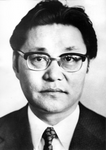Presidential elections were held in Mongolia on 6 June 1993,[1] the first time a head of state had been democratically elected in a competitive election. The result was a victory for the incumbent President of Mongolia, Punsalmaagiin Ochirbat who won 59.89% of the popular vote. He was nominated as presidential candidate by a coalition between the Mongolian Social Democratic Party (MSDP) and the Mongolian National Democratic Party (MNDP). Prior to the 1993 election, He was chosen as president of the Mongolian People's Republic by the People's Grand Khural in the aftermath of the 1990 revolution.
| |||||||||||||||||
| Registered | 1,106,403 | ||||||||||||||||
|---|---|---|---|---|---|---|---|---|---|---|---|---|---|---|---|---|---|
| Turnout | 92.73% | ||||||||||||||||
| |||||||||||||||||
 Results by province | |||||||||||||||||
| |||||||||||||||||
Londongiin Tüdev, a renowned writer, editor, and prominent political figure[2] was nominated as candidate by the ruling Mongolian People's Revolutionary Party (MPRP), and won 40.11% of the vote.
Voter turnout for the election was at 92.73%,[3] which is the highest turnout percentage still to this day and the only time the turnout for a presidential election was over 90%.
Background
editFall of Communism
editFollowing the mass demonstrations in 1990 calling for democracy and reform, the General Secretary of the Mongolian People's Revolutionary Party, Jambyn Batmönkh, and other politburo leaders announced their resignation on March 1990, paving the way for democratic change in Mongolia.[4]
On 21 March 1990, during the 8th Extraordinary People's Grand Khural session, the following constitutional provision: "The guiding force of the Mongolian People's Republic is the Mongolian People's Revolutionary Party, which uses the all-conquering Marxist-Leninist theory in its operations." was removed from the Constitution of the MPR, officially ending 70 years of one-party rule.[5]
Transition to Democracy
editThe first multi-party elections were held on July 1990, for the People's Grand Khural and the State Little Khural with a high turnout 97.89%. The MPRP won both elections while opposition parties made modest gains. Ochirbat was re-elected as a deputy to the People's Grand Khural in the 1990 elections and was appointed to the newly created position of President of the Mongolian People's Republic in September.
In January 1992, a new constitution was ratified, renaming the country to Mongolia and changing Ochirbat's title to "President of Mongolia and Commander-in-Chief of the Armed Forces". After the ratification,parliamentary elections were held on June 28, 1992. The MPRP once again won a supermajority, securing 70 seats out of the total 76 seats in the reformed State Great Khural and 56.90% of the votes. This is largely attributed to the party's adoption of new ideas like multiparty governance and support for a free market economy. The MNDP, a coalition compromising of the Mongolian National Progress Party (MNPP) and the Mongolian Democratic Party (MDP), was led by Tsaikhiagiin Elbegdorj and won 4 seats and 17.49% of the vote. The MSDP, supported by the German SPD, won 1 seat and 10.08% of the vote.
Local elections were held in October, the same year. The ruling MPRP won all the 18 governorships for the country's provinces and almost 90% of all Sum (Mongolian administrative division, equivalent to that of a county in the US) legislature seats.[6]
Nominations
editBoth Ochirbat and Tüdev were members of the MPRP, but belonged to different factions within the party. During a party meeting in the spring of 1993, Ochirbat was rejected as the MPRP's pick for the presidential candidate, with the party instead selecting Lodongiin Tüdev, a well-known writer, editor and intellectual figure among Mongolians.[6]
In response, the MNDP and MSDP united as a coalition and nominated Punsalmaagiin Ochirbat as their coalition candidate for the 1993 presidential election.
Results
editPolling day began at 7:00 throughout the nation on June 6, and ended at 22:00. Punsalmaagiin Ochirbat won 59.89% of the votes and was re-elected as president at the age of 51, becoming the first democratic president to be elected.
| Candidate | Party | Votes | % | |
|---|---|---|---|---|
| Punsalmaagiin Ochirbat | MSDP–MNDP | 592,836 | 59.89 | |
| Lodongiin Tüdev | Mongolian People's Revolutionary Party | 397,061 | 40.11 | |
| Total | 989,897 | 100.00 | ||
| Valid votes | 989,897 | 96.48 | ||
| Invalid/blank votes | 36,073 | 3.52 | ||
| Total votes | 1,025,970 | 100.00 | ||
| Registered voters/turnout | 1,106,403 | 92.73 | ||
| Source: Nohlen et al. | ||||
References
edit- ^ Dieter Nohlen, Florian Grotz & Christof Hartmann (2001) Elections in Asia: A data handbook, Volume II, p490 ISBN 0-19-924959-8
- ^ "Renowned Mongolian writer Lodongiin Tudev passes away". MONTSAME News Agency. Retrieved 2024-10-05.
- ^ Nohlen et al., p491
- ^ Б.Дөлгөөн (2015-07-29). "МОНГОЛД АРДЧИЛАЛ ЭХЭЛСЭН ТҮҮХ". ikon.mn. Retrieved 2024-10-05.
- ^ Б.Дөлгөөн (2015-07-29). "МОНГОЛД АРДЧИЛАЛ ЭХЭЛСЭН ТҮҮХ". ikon.mn. Retrieved 2024-10-05.
- ^ a b "Report on Mongolian Presidential Election: June 6, 1993 | IFES - The International Foundation for Electoral Systems". www.ifes.org. p. 6. Retrieved 2024-10-05.

